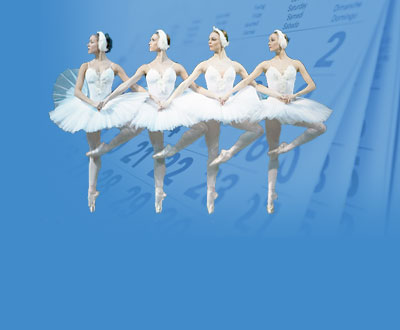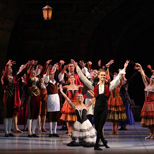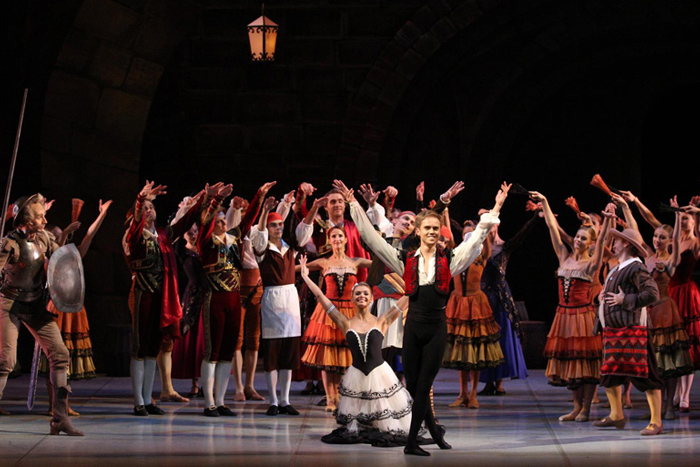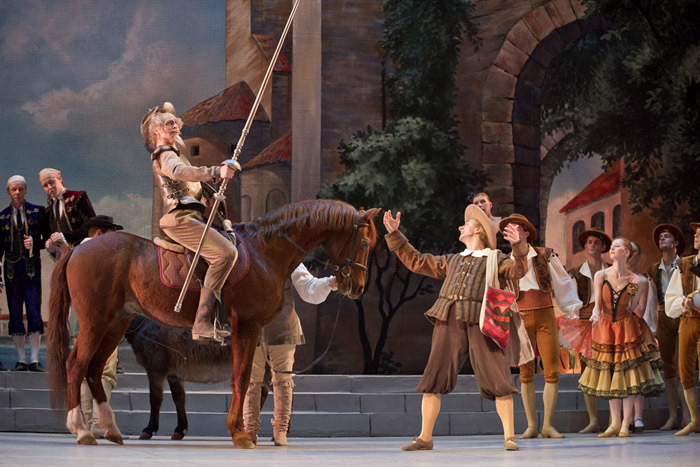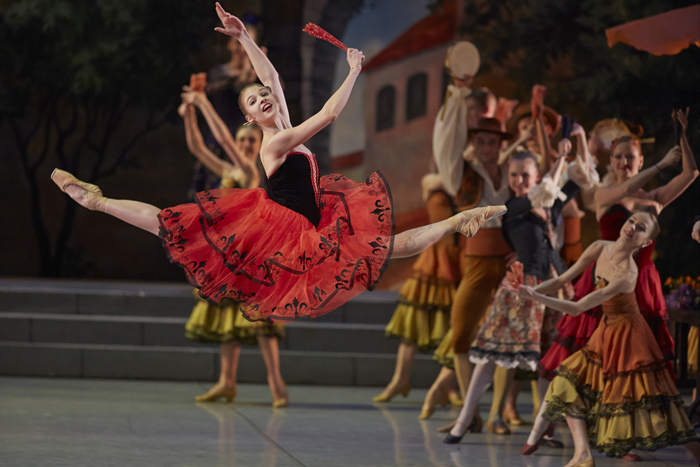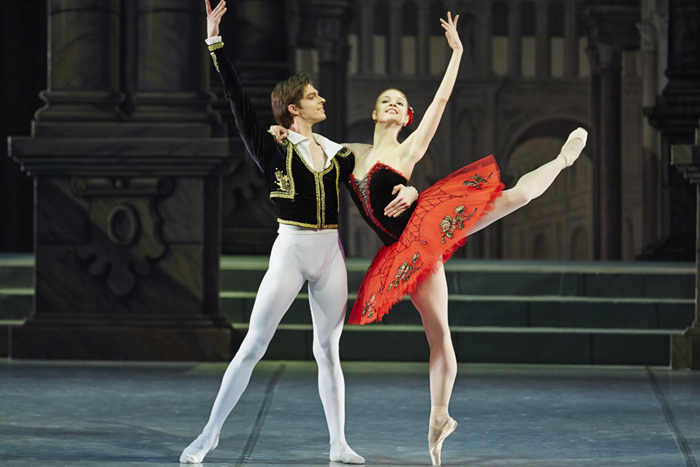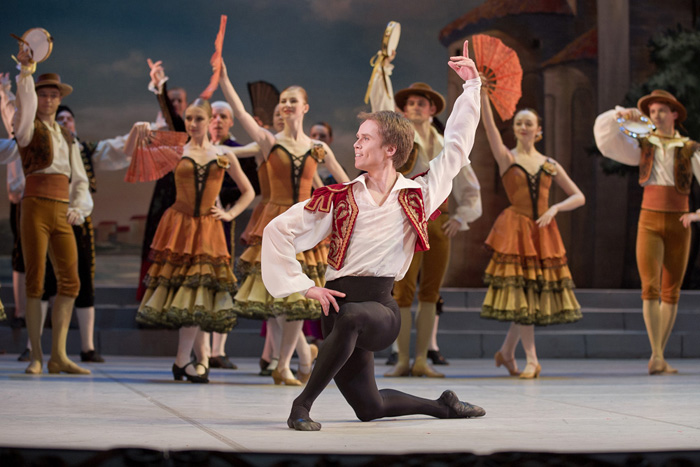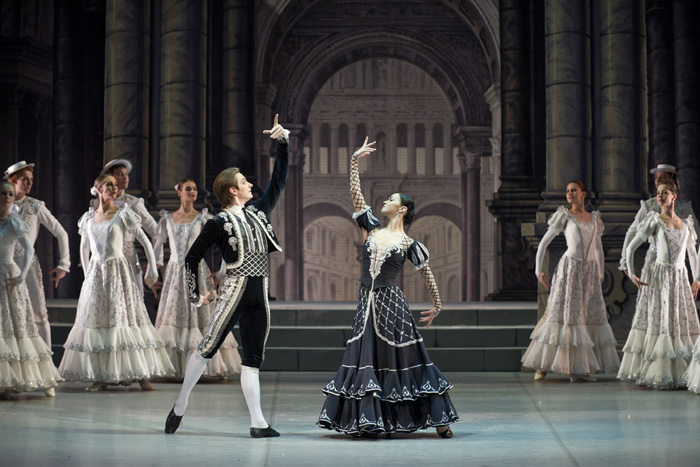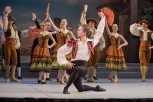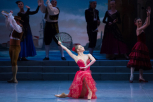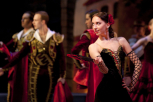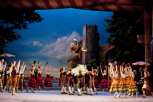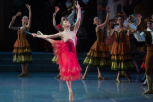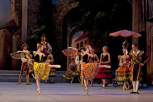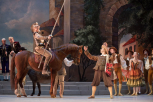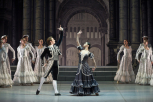Schedule of all St. Petersburg theaters on
one page >>
Please enter theatre's name, actor's name or any other keyword
Don Quixote (Mikhailovsky Theatre, ballet) - 18 January 2026 at 13:00
Mikhailovsky (ex. Mussorgsky) Theatre More info | Price: 137.49 - 312.47 USD
Genre: Ballet Age restriction: 12+ Length: 3 hours Intermissions: 2 Opening night: 11 April 2012
Credits
Libretto: Marius Petipa
Choreography by Marius Petipa and Alexander Gorsky
The performance also features choreography by Nina Anisimova, Igor Belsky, Robert Gerbek, Kasyan Goleizovsky, and Fyodor Lopukhov
Overall choreographic revision: Mikhail Messerer
Assistants: Evgeny Popov, Anna Razenko
Set Design: Vyacheslav Okunev
Head of Production Costume: Alla Marusina
Lighting Designer: Alexander Kibitkin
Music Director of the production: Pavel Bubelnikov
Sets and costumes produced at Vozrozhdenie Theatrical Design Studios
Artists
Basil — Ivan Vasiliev
Premiere of the first production at the Mikhailovsky Theatre: 21 November 1996
Premiere of the new revised version: 11 April 2012
Don Quixote is one of the most life-affirming, colorful and festive ballets. It’s interesting that despite its name, this brilliant piece is not a stage version of the famous novel by Miguel de Cervantes, but an original choreographic work by Marius Petipa vaguely based on Don Quixote.
In 1869, the Moscow Bolshoi Theatre gave a première of the comic play staged by Marius Petipa to Minkus’s music, telling a story of the failed wedding of a young beauty and a rich nobleman, because of the true love of the heroine to a poor guy. In 1871, Petipa created a new version of the ballet for the première at the Bolshoi Kamenny Theatre in St. Petersburg. In 1900, a new production of Don Quixote was staged by Alexander Gorsky. Gorsky kept the scenario plan and, partly, Petipa’s choreography. Gorsky organized the crowd scenes in a new way to avoid “any symmetry”. Borrowing from the principles of theatrical aesthetics of the Moscow Art Theatre, Gorsky did much for the “revival” of academic ballet.
In 1902, the Gorsky’s production was shown at the Mariinsky Theatre. The stars of the imperial stage, as Mathilde Kschessinska (Kitri), Nicholas Legat (Basilio), Enrico Cecchetti (Sancho Panza) contributed to the success of this remarkable performance. The production became the classical one.
Prologue
Don Quixote, having read his fill of romances about knights and chivalry, decides to set off on his travels in order to achieve great feats, which will bring glory to his name. As his sword-bearer, he chooses the loyal Sancho Panza, a man of sober outlook who is not prone to dreams.
Act I
In Barcelona there is festive animation in the air. Kitri, the daughter of the innkeeper, is flirting with Basilio, the barber, who is in love with her. Finding them together Lorenzo, Kitri’s father, chases Basilio away: the barber is no fit match for his daughter. Lorenzo intends Kitri to marry Gamache, a rich nobleman. Kitri refuses outright to submit to her father’s will. At the height of the merry-making, Don Quixote appears in the square, accompanied by his sword-bearer, Sancho Panza. Catching sight of the innkeeper, Don Quixote mistakes him for the owner of a knight’s castle and greets him with respect. Lorenzo responds in like terms and invites Don Quixote into the inn. Sancho Panza stays in the square. But when some young people start to mock Sancho, Don Quixote immediately hurries to his sword-bearer’s rescue. Seeing Kitri, Don Quixote takes her for the beautiful Dulcinea, whom he has seen in his dreams and chosen as ‘the lady of his heart’. But Kitri disappears. She has run off with Basilio. Lorenzo, Gamache, and Don Quixote set out to look for her.
Act II
Scene 1
Kitri and Basilio are hiding in a tavern. Here they are found by Lorenzo, Gamache, and Don Quixote. Lorenzo wishes to make an immediate announcement of the betrothal of Kitri and Gamache. But Basilio, by agreement with Kitri, commits fake suicide. Kitri sobs over the body of her sweetheart. Don Quixote, overcоme by noble indignation, accuses Lorenzo of hardheartedness and, threatening him with his sword forces him to agree to his daughter’s marriage with the barber. Basilio jumps to his feet — there is no point in him pretending to be dead any longer.
Scene 2
In the glade by the windmills is a sprawling gipsy encampment. Here too is a travelling puppet theatre. Don Quixote and Sancho soon appear on the scene. The owner of the puppet theatre invites Don Quixote to watch a show. Don Quixote follows the performance with rapt attention and, forgetting it is theatre, rushes on to the stage, sword in hand, to defend those, who need his protection. He breaks down the stage, sends the puppets flying and, catching sight of the windmill, mistakes it for the evil magician, whom he has to get the better of. Grabbing a mill sail, he is first lifted into the air and then falls to the ground.
Scene 3
The wounded Don Quixote and Sancho Panza find themselves in a forest. To Don Quixote, the forest seems to be full of monsters and giants. Sancho Panza settles Don Quixote down to sleep, while he runs off for help. In his dreams, Don Quixote sees Dulcinea, ‘the lady of his heart’, surrounded by Dryads and fairies. Sancho Panza comes back with the Duke and Duchess, who have been hunting in the forest. He begs them to help Don Quixote. The Duke and Duchess invite the wandering knight to visit them in their castle.
Act III
The Duke’s castle. All is ready for the reception of Don Quixote. Having heard from Sancho Panza the happy story of Kitri and Basilio’s love, the Duke and Duchess have kindly agreed to allow them to hold their wedding party in the castle. Don Quixote and Sancho Panza are invited to occupy the seats of honor. A solemn procession files past. Catching sight of Kitri, Don Quixote again mistakes her for ‘the lady of his reveries’. But the Duke and Sancho Panza manage to persuade him that she is the very same innkeeper’s daughter, whom he helped to unite with Basilio, her sweetheart. The festivities continue. All thank the valiant knight and his faithful sword-bearer.


 en
en es
es